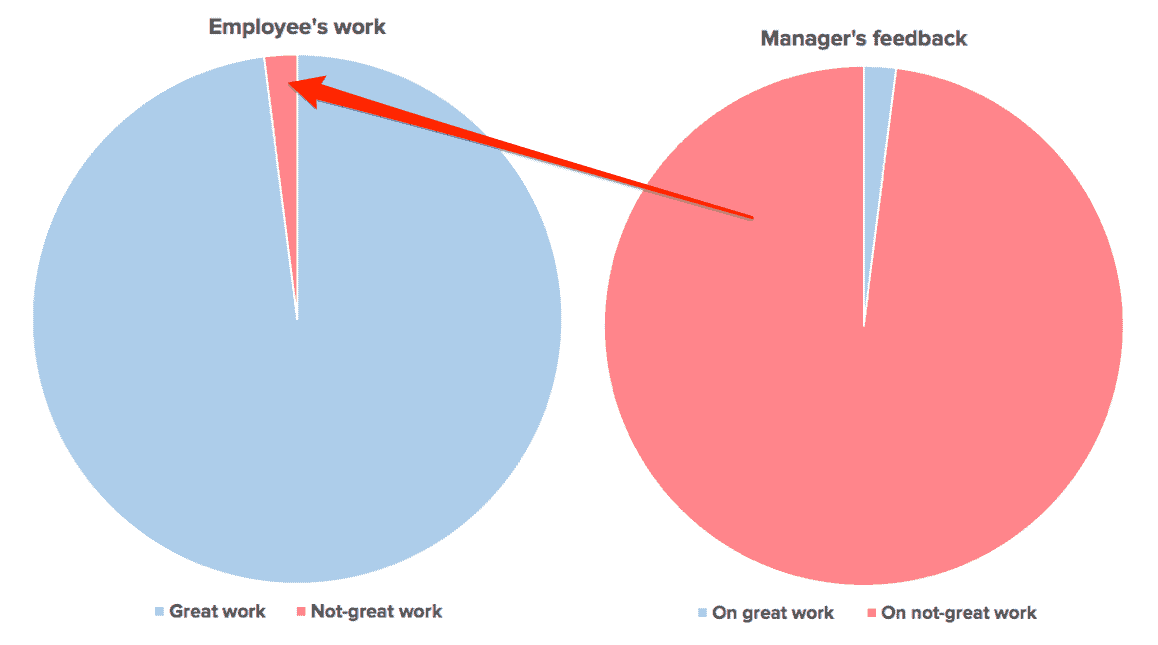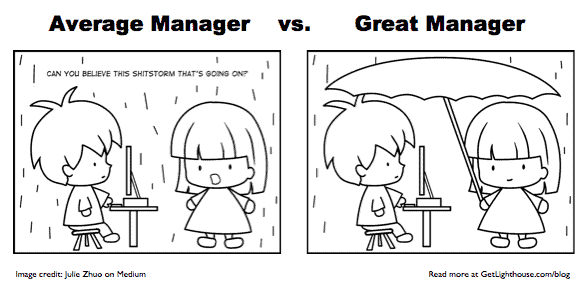At many companies, low morale is a fact of life. Any number of problems can stifle people, leaving them unmotivated and struggling to do their job.
As a manager, you may feel low morale yourself; no one is immune to the harsh realities of the modern workplace.
Gallup's engagement stats show us year after year that little is changing. On average, two of every three people are not engaged at work.

What can you do about low morale?
It's easy to feel helpless when you're dealing with low morale issues. In fact there's a term for when you or your team members lose all hope: learned helplessness.
However, today is about what you can do to make a difference before it gets that bad.
Remember: As a manager, you can make things better for those around you. It's one of our all-time favorite quotes from the legendary leader, author, and former CEO of Intel, Andy Grove:

So whether you're thinking about leaving yourself, you see low morale you want to fix on your team, or you're taking over a team with low morale, here's what you can do to make a difference.
Table of Contents:
- How to Motivate a Team With Low Morale:
- Further reading
How to Motivate a Team With Low Morale in 5 Simple Steps
Below are suggestions, data, and tactics you can try with your team. Every situation is unique, so your mileage may vary. However, there's a good chance some of these will make a bigger difference than you might expect.

1) Talk about the elephants, and why you're staying
Some of the most dangerous things that can undermine a good team are the things that go unsaid. As a manager, you have to get comfortable having difficult and uncomfortable conversations.
Ed Catmull, cofounder of Pixar Animation Studios wrote in Creativity, Inc on the value of candor in management:
"Candor isn't cruel. It does not destroy. On the contrary, any successful feedback system is built on empathy, on the idea that we are all in this together, that we understand your pain because we've experienced it ourselves.”
There are few bigger elephants in the room for a manager than you and your team members being unhappy and thinking about leaving.
One elephant that is even bigger though is death. Sheryl Sandberg wrote about dealing with her husband's death, where no one knew what to say or how to help her. So she tackled it head on by talking about it with her team one by one. As she wrote in a poignant public Facebook post:
"Once I addressed the elephant, we were able to kick him out of the room.”
By talking about it, they were able to remove a blocker to working well together. People no longer felt like they had to tip toe around her, and they knew what to say (and not to). It was a huge relief for Sandberg and her team to take the discussion head on.

Kick the elephant out of the room.
There are a few things you can do to tackle the sticky issue of low morale and people thinking about quitting or interviewing elsewhere.
First, you can be honest about your situation. Share a bit about what you've found challenging and heard from others on the team. If you've thought about leaving, they probably have too, so if you have trust in your relationship you can be frank there.
It can also help to just let them vent. In many cases, people just want to feel heard.
If you're lucky you might even hear something that is within your control. At that, point you can do something about it to help them.
You may be surprised how much even small wins and progress can help them feel better about their job and boost employee morale.
Most importantly, by talking about this elephant in the room, you're more likely to have your team member support you; if they end up leaving, you may need their help finding and training a replacement, or need them to help you with more than the standard 2 weeks notice.

2) Help with their career growth
We talk about the value and importance of career discussions often on the Lighthouse blog. And for good reasons:
- It's the #1 perk people want at work. A lack of opportunities to advance was the #2 reason people quit their jobs in 2021, according to Pew Research Center.
- It's a top quality people look for in their next job. 52% of Millenials say growth opportunities make an employer more attractive, reports PwC.
- The cost is often little or nothing to a manager. Helping your team members achieve their career goals doesn’t have to break the bank. You can help them grow by teaching them new skills, finding projects for them that present new challenges, and helping them find mentors.
Even when your company is struggling, or simply has morale issues despite it growing, you can and should still look to grow your people.
In addition to the above benefits, in particular it can help in low morale situations in a few key ways:
- Improve retention: Progress on their career and skills can give them enough reason to stay while bigger morale issues are fixed across the company.
- Strengthen your team: When morale is low, it's harder to recruit people to your teams. A depressed workplace can be felt when a candidate walks in. Improving the team you have is the fastest way to improve performance for you now.
- Help their career: If you and/or they end up leaving, your investment in their growth and development gives them another bullet point or two for their resumes, which can be huge long term for their career or future interviews. You always remember the managers who helped you.

How do I grow them?
Helping your people grow can be easier than you think. Start with a conversation and then look for any ways to make incremental improvement.
First, you need to identify the area to help them grow.
If they have a certain next career move they want to make, then focus on the skills you feel they would need to improve to get that job here or somewhere else.
Consider what would make a good talking point in an interview, or bullet point on their resume. Help them do those things now. You may want to privately even frame them this way to your team member to tap into further motivation for them.
Meanwhile, if they're just getting into their current level or role, then you as manager should be their coach; take a larger look at their work and look for strengths to enhance and weaknesses to mitigate or work on. Consider their Task Relevant Maturity for their responsibilities and be more hands on in those areas.
Looking for more help and tactics on career growth for your team?
- Learn how to start a career growth conversation 3 different ways here.
- Get super tactical examples of things you can do to grow your people without promoting them here.
- To be great, managers must become coaches (learn why & how)

3) Praise and recognize what you can
Researchers curious about the workplace have long questioned what separates great teams from average and poor ones. One difference turns out to be praise.
In research published in the American Behavioral Scientist, researchers Heaphy and Losada, found:
"The factor that made the greatest difference between the most and least successful teams was the ratio of positive comments to negative comments...
The average ratio for the highest-performing teams was 5.6… The medium-performance teams averaged 1.9… But the average for the low-performing teams, at 0.36 to 1, was almost three negative comments for every positive one.”
Think about your team. What do you think your ratio is? Try counting for a week and seeing what you find for yourself and your team.

Break the cycle.
One of the hardest parts about a workplace with low morale is everyone's attitudes. You can often cut the tension in the air with a knife.
When your office or team is like that, it's easy to be more critical and negative. Bad attitudes and poor treatment of one another becomes a self-reinforcing cycle of sadness and aggression. Don't let that be your team.
The example you set is one of the most powerful tools you have as a leader. It may be hard at first, but the payoff can be huge if you can start finding more ways to praise and positively reinforce your team.
As Dale Carnegie writes in How to Win Friends and Influence People, "Praise the slightest improvement and praise every improvement. Be hearty in your approbation and lavish in your praise."
If anyone on your team does something great, let them hear it loud and clear. Take the time to recognize your unsung heroes. Ask your team who they think is going unrecognized or what work is most thankless.
Want more ideas for giving praise?
- You can learn 5 ways to give praise in creative ways here.
- Want to get back to basics? Here's the 3 keys to giving effective praise.
- A step by step guide: How to Praise Your Team to Bring Out Their Best

4) Demonstrate your loyalty to your team
One of the biggest mistakes bad leaders make is forgetting that loyalty is a two way street. Often, it is the worst of leaders who treat their people poorly, and then wonder why those same people are not loyal.
With mass layoffs sweeping across the U.S. in late 2022, there are plenty of reasons for employees to feel nervous. In 2023, a survey of 36,000+ employees in 20 countries found only a little over 50% of employees feel like their manager is on their side. In practice, this might mean that every other person on your team doesn’t fully trust you.
Be different. Earn their loyalty.
When things are difficult and you have low work morale, it can be easy to become every person for themselves. Those kinds of politics serve no one.
If you instead continue to support and respect your team, you'll earn their loyalty not just now but throughout their career. Play the long game.

Make a grand gesture.
In addition to the smaller things we've described already, the occasional larger gesture can have a really big impact on your team. They will remember what you did for them during the good times, and especially during the bad.
Here's a few ideas we've seen work for ourselves and other leaders in difficult situations:
- Stand up for your team in a significant way when it may be easier to "just go along with it."
- Fight for a key bonus or promotion for someone on your team particularly deserving.
- Take your team and their spouses out for dinner to thank them for their hard work and sacrifices.
It's amazing how often we hear stories from friends and readers alike how pivotal moments in their careers that they remember involve key actions by their managers to show loyalty to them. What are you doing for your team?

5) Do what You can
The 2023 report we previously mentioned also found that leaders’ stress levels are on the rise. And it’s not even a negligible number – 70% of the survey’s participants reported seeing their managers possibly or definitely stressed.
Increased workloads and the added complexity of managing people remotely (which many are also experiencing for the first time), are causing big changes in managers’ attitudes:
- Managers are 246% more likely to feel as if their jobs are compromising their ability to be happy
- Managers are 132% more likely to feel as if their organization only cares about the bottom line
When things are tough at work, it can be easy to get sucked into all the negativity. You can feel helpless and hopeless, too.
Refocus your efforts on what you can do for your team. That mindset will get you through this whether any of you stay and things get better overall or not.

What can I really do?
You can make a bigger difference than you may realize. In addition to the tactics we've described already, a few things you can do include:
- Shield your team from things when possible and appropriate. (More on the nuance of this in point #5 here)
- Look for ways to be a part of the solution by helping create changes that can help.
- Put more effort into managing up so you can help your manager help you and your team, too.
- You can adopt traits from one of the 4 most popular manager types
A Story of Making Change
A friend of mine was in one of these situations a couple years ago.
The engineering organization was really frustrated by the processes that the company had set out for them. The product was also suffering because of it. My friend was thinking about leaving, as were many on their team.
He talked candidly with his team in their 1 on 1s about what he and they were both struggling with. Many admitted to interviewing for other jobs or considering it.
Rather than give up and leave, they did something about it.
Working with some of the other leaders in their group, they started working on making changes to what were the worst bottlenecks and frustrations for the team.
Slowly, things started to get better. The small changes gave people hope, and evidence for larger changes they needed senior leadership buy in for.
Thanks to their efforts and persistence, things are much better now. After 6 months of struggle, totally new processes are in place that removed the vast majority of problems. Product is shipping fast again, and people are staying and growing. Yet, this only happened because managers decided to focus on what they could control.

You have more control over low morale than you think
The easy way out is to give up and be as unhappy as those around you. Instead, what great leaders do is step up and do what they can to make a difference.
Be a bright light in a dark time.
No matter what happens, the act of trying things can help your own psyche. It gives you hope that things could still get better; what you're trying might work!
It also helps you make some incremental progress to improve things, which can help your own morale.
Most importantly, these efforts will be noticed by your team. It's in these moments that you'll earn their loyalty.
Then, where ever you go, your good people will follow their leader that took care of them in good times and bad.
Play the long game as a leader when you're facing low morale, and you create a win-win scenario. Either you're part of a major victory making things better, or you earn the respect and loyalty of your team who you'll be able to work with again in the future.
Further reading:
Check out these great Lighthouse posts on improving low morale, engagement, and more:
More tips for improving morale:
- How you're causing low employee morale at your company
- How to motivate an Underperforming Employee
- Leading Happy Teams: 5 Ways to Keep Your Team Happy in a Recession
Tips for increasing engagement and better motivating your team:
- 5 Ways How to Motivate Your Team Without Breaking the Bank
- Top 5 Courses for Improving Your Motivational Skills
Understanding turnover and keeping great employees from quitting:
- 13 Reasons Why Great Employees Quit
- Why Employees Suddenly Quit
- How To Calculate Your Employee Retention Rate
What causes low morale?

Causes of low morale in employees can include:
- Not managing based on task relevant maturity
- Having a jerk on their team
- Not giving your employees engaging work
- Managers ignoring their feedback, leading to deep-seated long-term issues
- Not giving your employees a sense of purpose or meaning in their work
How do you fix low morale?

There are several things you can do to help improve low morale in your team, including:
- Setting employees up with a career growth plan and making sure they're making progress
- Using praise and recognition to give employees a sense of purpose and keep them engaged
- Supporting your employees and considering little ways you can show them you care
- Making changes that you have control over to improve tough situations
To learn more about how to fix low morale, and learn about detailed examples of fixing low morale, read more here.
Why is employee morale so important?

Low morale affects everything from employee engagement to productivity and efficiency. When someone has low morale they're likely to affect the morale of those around them, something that is doubly true if that person is a leader.
The more people that have low morale, the harder it will be to collaborate and get things done. Work is also a lot less fun when you're around someone unhappy with their job.
To learn more about why employee morale is important and how to improve it, read: How to Turn Around an Underperforming Employee.
How do you deal with low team morale?

There are several effective steps a manager can take to motivate a team with low morale. For example:
- Provide opportunities for training and career growth.
- Consistently give feedback that recognizes excellent work.
- Build trust and loyalty by being available for your team and their needs.
- Lead by example and take responsibility for issues that cause low morale.
- Have regular, actionable 1-on-1s where you discuss their growth and any steps that can be taken to improve the overall morale of the team.
How do you rebuild employee morale?

Regular 1-on-1 meetings can be an effective way to rebuild employee morale, providing feedback, discussing career growth and opportunities, and addressing any issues that may have led to low morale within your team.
To address low morale during 1-on-1 meetings, it's important to identify and address the factors that might have led to it, such as poor communication or a negative work environment. Employees often have career aspirations and goals. By providing them with training and development opportunities, managers can help them achieve those goals and boost their morale.




